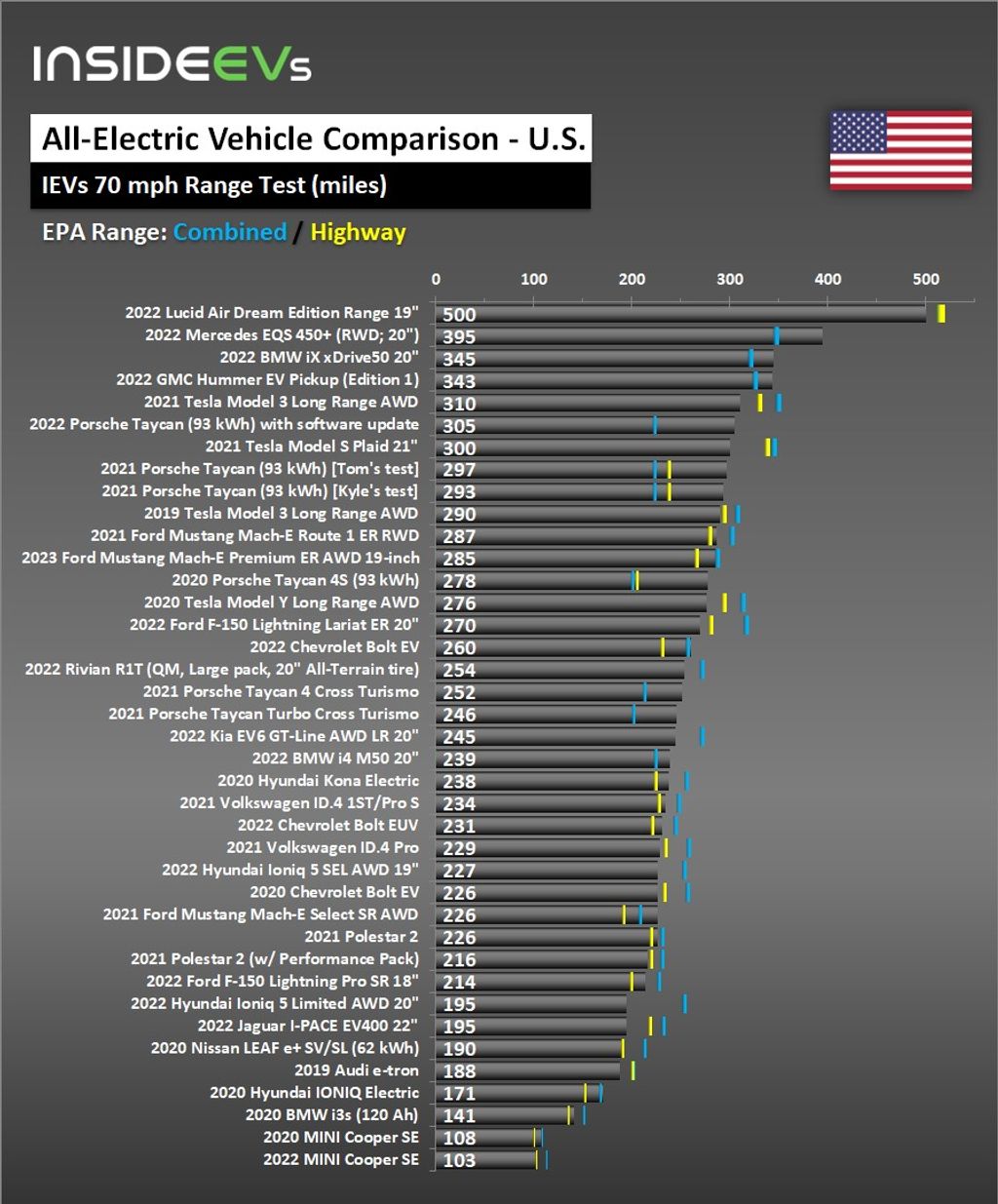Ford dropped us off a 2023 Mach-E Premium equipped with the new BlueCruise 1.2 to check out how the new features improve the system that had already been awarded Best ADAS system by Consumer Reports. And since we had the car for a week, we figured it was time to give the Mach-E another go at the InsideEVs 70-mile-per-hour range test.
We already conducted our 70 mph range tests on the same spec Mach-E in 2021, but since then Ford has made some efficiency updates and has also opened up 3 more kWh of the battery pack to boost the usable capacity from 88 kWh to 91 kWh. In that range test, the Mach-E ended up going 285 miles before we exhausted the pack.

A 2023 Ford Mustang Mach-E in Cyber Orange
The vehicle we tested in 2021 had a combined EPA range rating of 270 miles, and a highway EPA rating of 249 miles. With the improvements that Ford has made, the same spec Mustang Mach-E (AWD with the extended range battery pack) now has a combined EPA range rating of 290 miles and a highway rating of 268 miles.
We also had the opportunity to conduct our 70 mph range tests on an all-wheel-drive standard range Mach-E and a rear-wheel-drive California Route 1 trim. The standard-range Mach-E went 216 miles, and the California Route 1 test ended with 287 miles on the trip gauge when the battery was depleted.
| Segment Of The Test | Average Consumption | Miles Driven | Total Miles |
| 100% to 75% | 3.0 | 71 | 71 |
| 75% to 50% | 3.1 | 72 | 143 |
| 50% to 25% | 3.1 | 70 | 213 |
| 25% to 0% | 3.1 | 72 | 285 |
Surprisingly, our test mirrored the first test we did with an AWD extended-range Mach-E and ended with the same result: 285 miles driven. We were expecting to best our first test since the 2023 Mach-E we tested has 20 more miles or EPA-rated range.
However, it was slightly colder in this test than it was when we did the first one. When started out in the morning, it was in the upper 50s, and for most of the test, the temperature was in the mid-60s. When we range-tested the vehicle in 2021, it was perfect range weather as the temperature was in the 70s for the whole drive.
Check out the full library of InsideEVs 70 miles-per-hour highway range tests
The consumption rate was 3.1 miles-per-kilowatt-hour, slightly worse than the 3.3 mi/kWh we observed in our first test. Both vehicles were equipped with the same tires and had similar miles on the odometer when they were tested. We set the tires to the manufacturer's recommended tire pressure and we always place the vehicle in the most efficient driving mode offered. In the case of the Mach-E, that's the Whisper driving mode.
There was one more difference in the two tests that may have accounted for the part of why the 2023 Mach-E with a longer EPA-rated range didn't beat the 2021 car. That was the fact that in the first test, we didn't use climate control because the temperature was so that we didn't need it.
Gallery: 2022 Ford Mustang Mach-E GT: Review
However, back when we conducted that test, we were still developing our set testing procedure for the 70 mph range tests, and we hadn't included climate use at the time. Shortly after we did that test, we adopted the policy that in all of our range tests, we would have the climate control set to somewhere between 68° and 70° Fahrenheit and on the lowest fan setting available - just enough to keep us comfortable.
We had to make that change once we realized we'd be conducting these tests year-round, and not using climate control during some tests wouldn't be possible. That, plus the colder temperature during the test likely were the two main reasons the new Mach-E didn't outperform the older version in the tests.
About our highway range tests:
We always like to mention that these range tests aren't perfect. There are variables out of our control, like wind, traffic, topography, and weather. However, we do our best to control what we can.
We conduct these 70-mph range tests to provide another data point for potential customers that are looking for as much information on the driving range of a particular EV as they can get.

